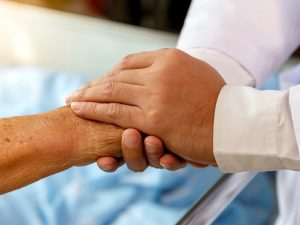On Monday when I went to see my friend Beth who’s recovering from two recent back surgeries, she told me that her doctor had just visited, examined her, and reported that she’s coming along nicely. Good news! But as I learned more, the news became more astounding to me:
Beth, who is in her early eighties, is at home in San Miguel de Allende, in a hospital bed set up in her living room on the ground floor of her house. The doctor who came to see her – to pay a house call on a Monday morning – is her Mexican neurosurgeon. And he not only came to check on her, he also came bearing gifts, a big bag of fresh fruit. Would this – could this – ever happen anywhere else, especially in the U.S., I wondered? My answer to my own question was “No.”
I imagined this doctor — whose name I don’t know, but to me he is emblematic of Mexican doctors I’ve known or have heard of — stopping at a mercado on his way to Beth’s and choosing the freshest, most beautiful fruit for her: a bunch of plump, sweet green grapes (maybe he tasted one from the bunch for sweetness?); bright, fat tangerines now in season and in abundance; large, lemon-yellow bananas, always soothing and easy to eat.
I imagined him pulling up to Beth’s house in el centro, ringing the bell at the front gate, and standing there as if he were a friend or neighbor with time on his hands. But, no, this man is a neurosurgeon who has taken the time from his busy schedule to check on a patient in her home and bring her not just his medical expertise but his kindness. I call this kind of bedside manner “the human touch.”

I like to think that doctors north of the border would do the same, given half a chance, especially when they’re new to the profession and not yet burned out by it. But most American doctors, I believe, struggle mightily under the weight of heavy financial burdens – college and medical school loans, medical liability insurance, and so on – which preclude such time-consuming niceties. They must make every moment of their day count, because, well, Time is Money. This is, after all, the American ethos.
Here in Mexico, as we emigres come to learn, this is not the case. Here, Time is flexible, and Money is fungible. It takes us a while to let these truths sink in. Kindness – instead of cash – is king here, and it is most evident when we need medical care.
Last June, when I had surgery at the general hospital in Leon, Mexico, not far from San Miguel, I was deeply impressed by and immensely grateful for the care and kindness I received. I remember clearly, for example, just before I fell under the spell of the general anesthetic, one of the young doctors in the surgery room (there were several; this is a teaching hospital), held my hand sweetly and told me softly (in Spanish), “We are all here for you.” I closed my eyes and drifted off in childlike trust.
And not only medical doctors. Last year, my dear dentist, Hugo Nieto, after some dental surgery in his office, had his receptionist, Betti, accompany me home and see that I got settled in comfortably because I was still somewhat groggy from the anesthetic and unsteady on my feet. This kind of kindness is normal here. And there’s no extra charge.

I’m sure that many of my WOW readers who live, or have lived, in Mexico have had similar Mexican-human-touch medical experiences, and I invite you to share your own anecdotes in the Comments below. I’d love for WOW readers all over the world to know more about Mexican kindness – and not just from me.
